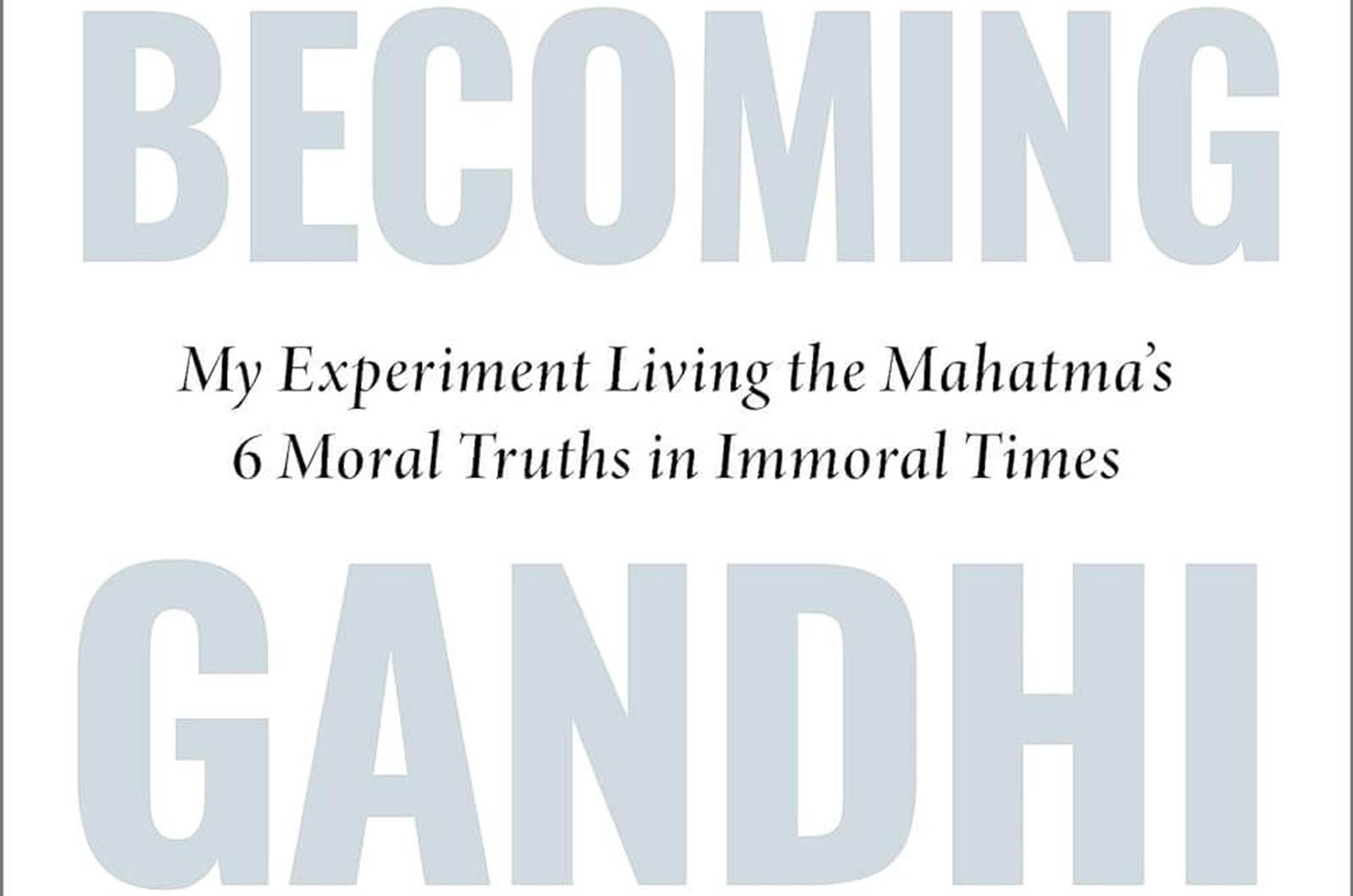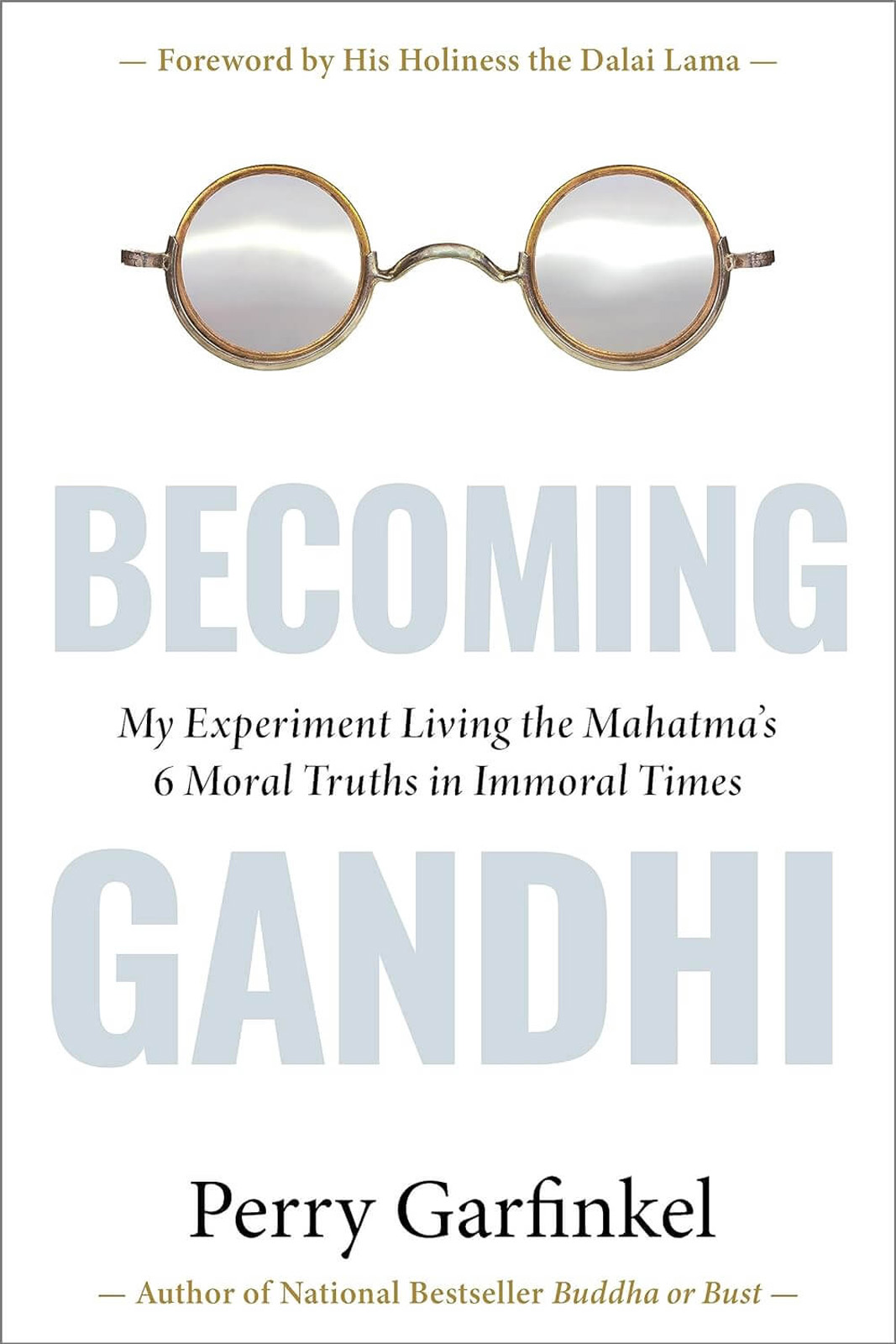Becoming Gandhi: My Experiment Living the Mahatma’s 6 Mortal Truths in Immoral Times by Perry Garfinkel, Sounds True, 2024, 229 pgs., $27.99.
Long-time journalist and author of Buddha or Bust Perry Garfinkel chronicles in his new book a quest that at first seems impossibly out of sync with the barbarous 21st century of hyper-consumerism, scorched-earth political tribalism and ubiquitous cell phone distraction. In Becoming Gandhi, Mr. Garfinkel seeks to emulate the famous Indian leader who for most of his life adopted a stark personal simplicity that would garner him precious few followers on TikTok today.
Mr. Garfinkel is under no illusions about the likelihood of such a quest, nor is he under any parallel illusions about the man who inspired it: he’s done enough research about Gandhi to know the man was “not a saint or an avatar.”
But the figure of the man clearly fascinates him, and this fascinating book is the clear-eyed working-out of whether or not emulating Gandhi’s principles is possible in the world today.
There are five of these principles: truth, nonviolence, vegetarianism, simplicity and, finally, faith. One other principle — celibacy — Mr. Garfinkel admits “is not for everyone” (more than one biographer has hinted that it wasn’t much for Gandhi either).
The remarkable nature of Gandhi himself is the core of the book, radiating into every one of those basic principles. As Mr. Garfinkel puts it, Gandhi “innovated, motivated, masterminded, mobilized, moralized, and energized ... he is one of the few people in history called the ‘Father of the Nation’ without having been a military leader or president of his country.”
In the course of these pages, Mr. Garfinkel visits New Delhi and is appalled by its environmental pollution and “how Indians use their corner of the planet as a literal dumping ground.”
He travels to “the epicenter of Gandhiland,” the western state where Gandhi was born. He tours Gujarat Vidyapith, the university Gandhi founded in 1920. He re-traces the master’s footsteps in order to better understand his precepts.
Some of those precepts are more congenial to current events than others, of course. When referring to Gandhi’s practice of what he termed Satyagraha, his principle of nonviolent resistance, for instance, Mr. Garfinkel again bids his readers glance at the day’s headlines.
“It seems,” he writes, “we are further than ever from this ideal.”
Almost equally unreachable is the Gandhian principle of simplicity. The average American consumer, Mr. Garfinkel reports, produces five pounds of trash a day, and 140 million tons of waste are added to American landfills every year. And, as he adds, what we don’t simply toss out we tend to keep too long — hence the popularity of books like Marie Kondo’s The Life-Changing Magic of Tidying Up, but hence also the apparent unreachability of somebody like Gandhi, who owned one pair of spectacles and one article of clothing.
These pages brim with well-chosen quotes from Gandhi, as well as well-phrased insights about him by our author. Even if readers aren’t inclined to take on life-changes such as vegetarianism or nonviolent resistance, they’ll feel their understanding of this pivotal historical figure broadened by Mr. Garfinkel’s adventures in trying to adapt to his lifestyle.
As noted, that lifestyle is seriously at variance with our modern world (just as, to be fair, it was at variance with Gandhi’s own time). As Mr. Garfinkel notes, our collective “moral benchmark” has plummeted, according to the findings of social science.
“Or you can just read today’s headlines,” Mr. Garfinkel writes. “We lie, we cheat, we have affairs, we make heroes of people who bilk the system or celebrities famous only for being famous.”
Readers of Becoming Gandhi, seeing such gloomy but accurate characterizations of our own blighted era, will forge ahead in the book wondering if even Mr. Garfinkel’s undaunted optimism is pointless. Even he admits that being Gandhi is impossible. But the ongoing attempt itself can be illuminating. Could we taper our meat-eating, even if we don’t eliminate it altogether? Could we lie less, including to ourselves? Could we live with less?
The questions — like the tasks of becoming Gandhi — are always worthwhile.
Perry Garfinkel will host an author talk and book signing on Saturday, April 13. The event begins at 2 p.m. at the Carnegie in Edgartown, in partnership with Edgartown Books; location is 58 North Water Street, Edgartown.








Comments
Comment policy »